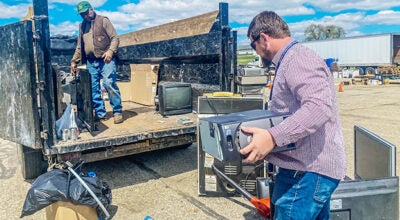Disaster aid in the works
Published 6:14 pm Wednesday, May 23, 2012

Michigan Agriculture Director Keith Creagh visited Berrien County May 23 along with Congressman Fred Upton.
Michigan’s fruit farms usually produce 240 million pounds of cherries annually. There won’t even be 10 million this season.
“It’s for the birds,” said U.S Rep. Fred Upton, speaking in Watervliet. “That is who it’s for because the birds are going to get it and no one else.”
Upton, R-St. Joseph, led a delegation of state officials to southwest Michigan Wednesday to survey and document the damage two weeks of beautiful weather in March did to devastate the area’s fruit crop.
On Rodney Winkel’s apple farm, 240 acres usually yield 800 to 900 bushels a season.
“He might get 50 bushels for the whole 240 acres,” said Upton, who spent the morning getting a firsthand look at the shellacking southwest Michigan fruit farmers endured from unseasonably warm March temperatures followed by April freezes.
“I started meeting with our growers back in March and hoped a freeze wouldn’t come and you could harvest apples in early August, but we got zapped pretty big,” Upton told more than 50 farmers gathered Wednesday morning at Berrien County Commissioner Jon Hinkelman’s farm south of Watervliet.
“Grapes, even the second buds are gone,” Upton said. “I don’t think we saw a single peach bud. As we know, the impact is pretty severe, not only on the ag community. We’re anxious to see the declaration of disaster move as quick as it can, but it has to wait for yield numbers to come in, so that’s a while yet, but we know what it’s going to be: zero. Once the state can show that, it will come to the feds.
“I’m committed to working on a bipartisan basis with our delegation to try to expedite that, but it’s just a Band-Aid. It’s not insurance; it’s a low-interest loan to pay back. I met with growers in Galien April 5, before the freeze. A couple of weeks later, I saw the same folks. They’ve got kids, so they’ve got resumes out, looking for other jobs with no income coming in for another year.”
Upton said it is not right that some crops, particularly in southwest Michigan, are not eligible for insurance.
“I don’t ever remember a freeze like this. Often, you’ll have one crop go down, but not literally everything. Where there would normally be a million buds, there were four. That’s the kind of losses we’re seeing from this pretty big blow.”
Michigan Agriculture Director Keith Creagh compared the situation to a similar problem in 2002.
“We did a zero-interest loan program,” Creagh said. “We’re actually looking to have a program that will help augment the federal program. The magnitude of this is unheard of. You guys do need financial assistance. We’ll work a program with commercial lenders — Greenstone, Huntington, PNC — and see if we can’t lock in some very low interest rates. Five years is proposed, two years until you pay on principal, so you can get in and get out.”






